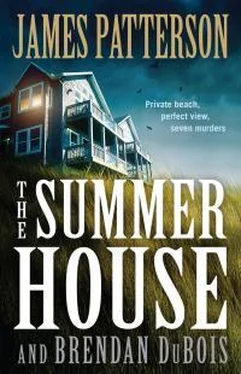The sheriff zippers the bag shut, then looks at Connie and Cook with a sad but determined look.
“That’s what happened,” she says. “That sergeant and those Rangers, they went into that house, all angry and fired up, and killed every living soul there. Even that little innocent baby. You know it, and I know it, and one of these days all four are gonna get a needle in their veins. You can count on it.”
Chapter 28
AT NEARLY 2:00 A.M. on Monday morning, following a very busy Sunday, the woman is very pleased to be out of her uniform, in civvy clothes, her body relaxing from not wearing all that damn gear. She’s carefully driving her civilian car on a narrow dirt road that borders a swampy area near Hunter Army Airfield, and when she comes to a wide part of the road, she stops the car, switches off the engine and lights, and steps out.
The damn wild area here is full of noise, from frogs to insects and birds, and speaking of birds, a Black Hawk helicopter and then another one fly overhead, going to the lit area on the horizon marking the runway for Hunter.
She leans against the fender of the car, the metal still warm, and pulls out a burner phone she purchased with cash and with a hat pulled over her eyes from the Walmart Supercenter on Abercorn Street.
Time check: 2:00 a.m. on the dot.
The phone rings, and she puts it up to her ear and says, “Yes?”
The connection is lousy, full of static and random pops and hisses.
“How’s it going?” comes the demanding male voice. It sounds like he’s on his way to the other side of the world.
“It’s going all right,” she says.
“You call that all right?” A louder burst of static and “…told me it would be open-and-shut, that the Army would come in for a day or…” More static. “…but they’re still there, aren’t they?”
“Yes, sir, they are,” she says. “But it’s a big case. I didn’t think they’d send down a special squad to work it.”
“Well, they did, didn’t they?” And his voice fades out. For a moment, she hopes he’s out of range.
No such luck.
He comes back and says, “What now? How much more coverage is this going to get?”
She shakes her head. “I’ll work it, don’t worry. We’ll get it wrapped up soon. I promise.”
“…better,” he says. “This Major Cook. You’ve seen and talked to him…” Another pause. “…next?”
“Excuse me, sir?”
He says, “I said, when are you talking to this Major Cook again?”
“Tomorrow,” she says. “I’m sure it’ll be tomorrow.”
“Tuesday? Tuesday?”
Shit, she forgot about the time.
“No,” she says. “Monday, later today.”
“Handle it, all right? Or you can forget ever…”
The line goes dead.
“Sir? Are you there? Sir?”
Dead air.
All right, then.
She switches the phone off, takes a penlight out of her pocket, switches it on, and removes the back of the burner cell phone, removes the SIM card, and snaps it in two. Then she walks to the edge of the road—damn it, thorns just scratched her left hand!—and tosses the broken SIM card and phone into the swamp.
For a moment, in the heavy air with the loud noises of the swamp, she looks over at the lights of Hunter.
Men, she thinks, shaking her head and going back to her civilian car. So damn weak.
Chapter 29
MY RINGING CELL PHONE wakes me up in the dim light, and I switch on the bedside lamp and grab the phone, resting on Bruce Catton’s Glory Road, which has traveled here with me and so far remains unread. At my side, my Panasonic Toughbook—my Army-issued laptop with which I’ve been reviewing and re-reviewing the four Rangers’ service records—falls to the floor. Which is fine, since the laptop is designed to perform even after being nearly blown up.
Like me.
“Cook,” I answer, and my caller replies with a series of heavy, deep coughs. When the coughing stops, I say, “Colonel Phillips?”
A weak voice says, “Good guess. Maybe you should be a goddamn detective or something.”
I check the time. It’s 6:00 a.m.
“You’re up early, sir,” I say.
“Got a lot going on,” he says. “I’ve read your email. Anything else to add before I brief the provost general?”
I rub at my sleep-encrusted eyes. “Nothing much except the news media are down here like sharks, smelling chum in the water after being starved for a week. They didn’t stop knocking on my door until about 1:00 a.m.”
“Gotta love the Constitution, don’t you?”
“All the time, sir,” I say.
He laughs and coughs twice, then says, “Game plan for today?”
“First I’m going over to Hunter to talk to Captain Rory O’Connell,” I say. “The entire Fourth Battalion has been dispatched, and he’s been assigned as rear detachment commander. I want to find out more about our four arrested Rangers.”
“What about the battalion commander? Or his XO? Or their platoon leader? They should be passing on that information to you, not a rear echelon officer.”
“They’ve all been deployed overseas. Sir. Just after we arrived.”
I can hear his labored breathing over the phone.
“That’s damn convenient, isn’t it?” he says. “Having the entire Fourth Battalion deployed. Making it damn near impossible to interview fellow Rangers and witnesses.”
“My thoughts exactly,” I reply.
“Good,” he says. “More you follow the way I think, the better your career will be. Get the job done.”
“Yes, sir,” and Phillips disconnects.
I swing out of bed, careful of my left leg, and damn if I don’t smell coffee. Not unusual since the coffee shop is just down at the other end of this strip of motel rooms, but it smells awfully close.
I toss a blanket over my shoulders, walk over, and see little squares of paper on the floor, like some odd cyclone dropped them off before I went to sleep. Bending over and catching my breath, I gather them up.
Handwritten notes from desperate journalists wanting interviews. Atlanta Journal-Constitution. USA Today. MSNBC. New York Times. Savannah Morning News.
And a sweet little scribbled note in red ink from Peggy Reese, of the Sullivan County Times, complete with phone number:
Dear Army officer,
It would really make me happy to talk to you about what happened at The Summer House.
Sincerely,
Peggy Reese
I crumple up the notes, toss them into a wastebasket, unlock the door, and peer out. It’s still dark outside, and there’s a shape of something in front of my door, and the sputtering and flickering of a small gas stove. My eyes adjust, and it’s Special Agent Manuel Sanchez, stretched out in a sleeping bag on top of a foam mattress, leaning against the wall, wearing a simple black T-shirt. Near him is the gas stove with a coffeepot gently boiling.
“Morning, sir,” he says, picking up the pot with a folded-over handkerchief. “Care for some fresh brew? Not sure what the shop over there is serving us, but it sure as hell isn’t good coffee.”
I drag one of the motel’s lawn chairs over and sit down next to my CID investigator. He’s smiling a good-natured smile, with his dark skin and perfect white teeth, but his eyes are always on alert, scanning back and forth. Sanchez is a man of reserved strength and violence. There’s a lot going on behind his eyes, and I’m glad he’s on my team.
He pours the coffee, and I say, “You’re the reason I stopped having people hammering at my door a few hours ago.”
“That’s right, sir,” he says, deftly lifting the cup to me. “Thought you needed a good night’s sleep after all the work yesterday.”
Читать дальше












